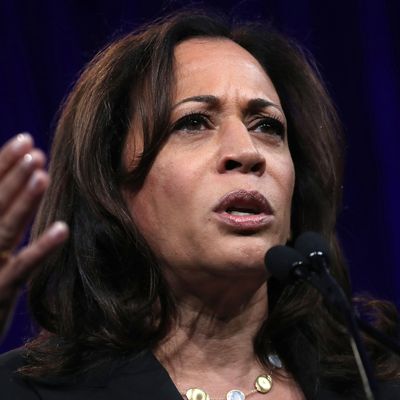
Seems like in most competitive presidential nominating contests, there’s a candidate who looks great on paper but rapidly loses altitude even before voters start voting. Democrat Wesley Clark had that quickly fading buzz in 2004, as did Republican Rudy Giuliani in 2008. In 2012, Tim Pawlenty made all the sense in the world as a consensus candidate — until he quit the race after a poor showing in the Iowa Straw Poll. And immediately after that, Rick Perry took off like a rocket only to be felled by his own words in two candidate debates. In 2016, Scott Walker terrified liberals with the potential power of his presidential bid — and then dropped out for lack of interest four years ago this week.
This year’s Democratic front-runner for Greatest Wasted Potential is currently Kamala Harris. From the get-go, she was a smart-money favorite. She was telegenic, well-spoken, and multiracial (half-Asian-American, half-African-American, and married to a white Jewish guy to boot), with a solid résumé of federal, state, and local offices — and nary an electoral defeat. She didn’t lean too far to the left or to the center. And she had an entirely plausible path to the nomination, one that had been successfully road-tested by none other than Barack Obama — though she had the added bonus of an early primary in her home state of California, perfectly scheduled to boost her into the lead if she achieved the planned breakthrough in South Carolina. On top of everything else, she had a boffo performance in the first candidate debate by beating up the candidate who represented the greatest obstacle to her strategy. You’d have to guess her people could just about taste victory at that point.
Yesterday, like a one-two punch to the solar plexus, two California polls were published showing how far Kamala Harris has fallen. One, from Capitol Weekly, has her at a weak fourth place with 11 percent of the vote, just a third of the percentage garnered by front-runner Elizabeth Warren. Worse yet, Emerson College’s latest survey has her in fifth place in her home state, with an anemic 6 percent, and running a point behind Andrew Yang.
Her fading prospects are also evident in the only recent survey from her supposed breakthrough state, South Carolina, conducted by YouGov, which shows her running a poor fourth behind Biden, Warren, and Sanders, with 7 percent of the vote. And nationally, in the RealClearPolitics averages, she’s at 6 percent, less than half her level of support two months ago.
What happened? Well, most obviously, Harris’s performance in subsequent Democratic debates did not match her impressive breakout showing in the initial tilt. But as Nate Silver noted at the time, Harris lost about a third of her first-debate polling “bounce” before the second event even arrived. And in that second debate, Tulsi Gabbard’s efficiently brutal critique of Harris’s record as California Attorney General put her back on her heels.
Speaking strategically, Harris just hasn’t found much oxygen in the race thanks to Biden’s durable support — particularly among the African-American voters Harris was counting on in places like South Carolina — and Warren’s growing strength. Indeed, Warren is looking more and more like the unity candidate Harris probably saw in the mirror when she was riding high.
Could Harris turn it all around? Sure. Her weak position in South Carolina and in California would change very quickly if she exceeds expectations in earlier states. One relevant precedent is John Kerry’s 2004 resurrection in New Hampshire, where he was badly trailing Howard Dean, after an upset win in Iowa. That’s almost certainly why she made a big investment in an Iowa field operation in August. But there are a lot of world-class ground games whirring along in Iowa; aside from Warren’s strong organization and Sanders’s army of volunteers, Booker got a good head start there and, more recently, Buttigieg poured money into the state. The only recent Iowa poll, from CBS/YouGov, gave Harris just 6 percent, a point behind Mayor Pete and far behind the Big Three of Biden, Sanders, and Warren.
Yes, Harris could again kick out the jams in the October and future candidate debates, but so could someone else. Her once big and broad royal road to the nomination is now a nearly imperceptible footpath through dense foliage. What she probably needs more than anything else is a stumble by Joe Biden or Elizabeth Warren.






























